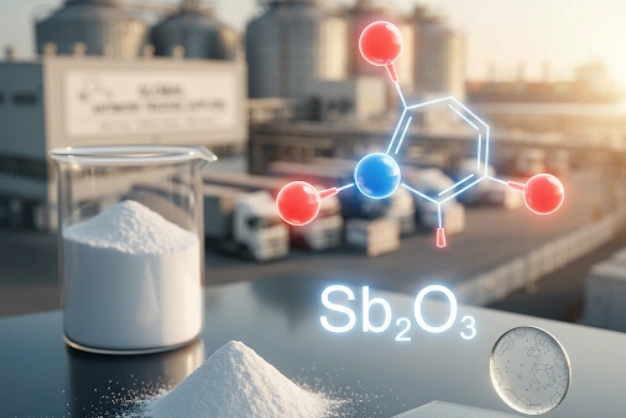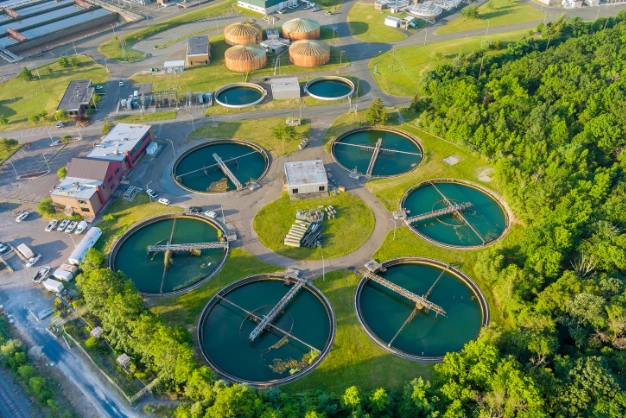Sodium Bentonite is a type of clay that consists primarily of the mineral montmorillonite. It is known for its ability to swell significantly when it comes into contact with water, absorbing many times its weight in moisture. This unique property makes it an effective sealing material and is widely used in various applications such as drilling mud, sealing ponds, and landfill liners. Sodium Bentonite is naturally found in sedimentary deposits and is often used for its ability to create impermeable barriers and its high cation exchange capacity.
Swelling Capacity: Sodium Bentonite can expand up to several times its original volume when it comes into contact with water. This swelling capacity is critical in applications like sealing, where it forms an impermeable barrier.
Absorption: This clay can absorb significant amounts of water, making it ideal for use in drilling mud and other industrial processes where water retention is crucial.
Viscosity: Sodium Bentonite contributes to the thickness and stability of fluids, particularly in drilling operations, where it helps maintain the suspension of particles.
Cation Exchange Capacity (CEC): Sodium Bentonite has a high ability to absorb and exchange positively charged ions, which is essential in water purification and soil conditioning processes.
Chemical Stability: Its stable chemical structure allows Sodium Bentonite to be used in a wide range of industrial applications without degrading or reacting negatively with other substances.
Eco-Friendliness: Sodium Bentonite is a naturally occurring, non-toxic, and biodegradable material, making it safe for use in environmental applications.
Natural Composition: Composed of natural minerals, Sodium Bentonite is used in environmental projects like landfill liners and soil sealants, where it helps prevent the leakage of contaminants.
Sodium Bentonite is formed through the weathering of volcanic ash in the presence of water. Over millions of years, the volcanic ash, rich in minerals like aluminum and silicon, undergoes chemical changes, leading to the formation of montmorillonite, the primary mineral in Sodium Bentonite. This process typically occurs in sedimentary environments, where the ash is deposited in layers and interacts with groundwater. As a result, large deposits of Sodium Bentonite are found in regions with a history of volcanic activity, particularly in areas where ancient volcanic ash beds have been preserved.
Once the Sodium Bentonite deposits are identified, the mining process begins. The clay is usually extracted using open-pit mining techniques, which involve removing the topsoil and extracting the clay-rich material from the earth. The mined clay is then subjected to various processing methods to enhance its properties and prepare it for industrial use.
Crushing and Drying: The raw Sodium Bentonite is first crushed to break down large clumps and then dried to remove excess moisture. This process ensures that the clay can be easily handled and processed further. Milling: After drying, the clay is milled into a fine powder to increase its surface area, enhancing its absorption and swelling properties. This powdered form is then packaged and distributed for use in various applications. Purification: In some cases, the Sodium Bentonite may undergo purification processes to remove impurities and improve its quality. This can involve washing the clay with water or chemical treatments to ensure that it meets the specific requirements of different industries. This well-structured approach to mining and processing ensures that Sodium Bentonite retains its essential properties while being prepared for a wide range of uses.
Foundry Sand: In the foundry industry, Sodium Bentonite is used as a binder in sand molds for casting metals. Its ability to form a strong, flexible bond with sand particles ensures that the mold retains its shape during the metal pouring process, resulting in high-quality castings. Sealants: Sodium Bentonite is also utilized as a sealant in construction and environmental projects. Its swelling properties make it ideal for sealing cracks and gaps in structures, such as dams, ponds, and landfills. When mixed with water, it forms an impermeable barrier that prevents water leakage and contamination. The eco-friendly nature of Sodium Bentonite, combined with its ability to create impermeable barriers, makes it a valuable material in various environmental applications.
Landfill Liners: Sodium Bentonite is commonly used in the construction of landfill liners to prevent the leaching of hazardous materials into the surrounding soil and groundwater. The clay’s ability to swell and form a watertight seal ensures that harmful substances are contained within the landfill. Soil Sealants: In environmental remediation projects, Sodium Bentonite is often applied as a soil sealant to prevent the migration of contaminants. It is particularly effective in creating barriers that stop the flow of polluted water or chemicals, protecting the environment from further contamination. In agriculture, Sodium Bentonite plays a crucial role in improving soil quality and animal health.
Soil Conditioning: Sodium Bentonite is used as a soil conditioner to enhance the water retention and nutrient-holding capacity of the soil. Its swelling properties help improve the soil’s structure, making it more fertile and better suited for crop production. Animal Feed Additive: In the livestock industry, Sodium Bentonite is added to animal feed as a binding agent and to aid in the digestion process. Its ability to absorb toxins and regulate the moisture content in feed helps improve the overall health and well-being of the animals. Sodium Bentonite offers several distinct advantages over other materials, particularly in applications where its unique properties are essential.
Superior Sealing Capability: One of the most significant advantages of Sodium Bentonite is its exceptional sealing ability. Unlike other sealing materials, Sodium Bentonite can expand multiple times its original size when exposed to water, forming an impermeable barrier. This makes it an ideal choice for applications such as landfill liners, pond sealing, and drilling mud, where preventing fluid leakage is critical.
Natural and Environmentally Friendly: Sodium Bentonite is a natural, non-toxic material, making it a safer alternative to synthetic sealants and chemical additives. Its eco-friendly nature makes it particularly suitable for environmental projects, such as soil sealing and landfill liners, where the use of harmful chemicals must be avoided.
Versatility in Industrial Use: Sodium Bentonite’s versatility allows it to be used in a wide range of industrial applications, from acting as a binding agent in foundry sand to serving as a key component in drilling fluids. Its ability to adapt to various conditions and retain its properties makes it a preferred choice in industries that require reliable and consistent performance.
Sodium Bentonite is not only effective but also cost-efficient, making it a popular choice in many industries.
Cost-Effectiveness: The widespread availability of Sodium Bentonite and its efficient extraction and processing methods contribute to its cost-effectiveness. Compared to other materials that might require complex manufacturing processes or costly chemical treatments, Sodium Bentonite is relatively inexpensive to produce and use. This affordability allows industries to implement its use on a large scale without incurring prohibitive costs.
Availability: Sodium Bentonite is abundantly available in many regions worldwide, particularly in areas with a history of volcanic activity. The extensive natural deposits ensure a steady supply, making it a reliable material for continuous industrial and environmental applications. Its availability also reduces the need for importing specialized materials, further enhancing its cost-effectiveness.
Choosing the right Sodium Bentonite for your specific needs requires careful consideration of several factors. Understanding these factors will help ensure that you select the most suitable type of Sodium Bentonite for your application.
Grade: Sodium Bentonite is available in various grades, each tailored to specific applications. The grade determines the clay’s swelling capacity, viscosity, and other key properties. For example, drilling grade Sodium Bentonite is designed to provide optimal viscosity and suspension characteristics, making it ideal for drilling mud in oil and gas exploration. On the other hand, foundry grade Bentonite is formulated to create strong bonds in sand molds for metal casting.
Application Requirements: Different applications may require Sodium Bentonite with specific properties. For instance, if you need a sealing agent for a pond or landfill liner, you should choose a grade with high swelling capacity and low permeability. In contrast, for use in animal feed, the Bentonite should meet the necessary safety and nutritional standards.
Drilling Grade: This grade of Sodium Bentonite is specifically formulated for use in drilling fluids. It provides the necessary viscosity and suspension properties to stabilize boreholes and carry drill cuttings to the surface. Drilling grade Bentonite is widely used in the oil and gas industry.
Foundry Grade: Foundry grade Sodium Bentonite is used as a binder in sand molds for metal casting. Its ability to form strong, flexible bonds ensures that molds retain their shape during the metal pouring process, resulting in high-quality castings.
Construction Grade: This grade is used in construction applications where a strong sealant is required. It is commonly used for sealing ponds, dams, and landfills, where its high swelling capacity and impermeability prevent water leakage.
Agricultural Grade: Agricultural grade Sodium Bentonite is used as a soil conditioner and animal feed additive. It improves soil structure by enhancing water retention and nutrient availability, and in animal feed, it helps bind toxins and regulate moisture content.
Pharmaceutical and Cosmetic Grade: This high-purity grade is used in the pharmaceutical and cosmetic industries, where it must meet strict quality standards. It is used in products like facial masks, ointments, and as a suspending agent in liquid medications.
Proper safety and handling practices are essential when working with Sodium Bentonite to ensure its safe use and to avoid potential hazards. Understanding these guidelines will help maintain a safe environment whether you are using Sodium Bentonite in industrial, environmental, or agricultural applications.
Ventilation: Ensure that work areas where Sodium Bentonite is being handled are well-ventilated. Proper ventilation helps minimize dust accumulation in the air and reduces the risk of inhalation.
Storage Conditions: Sodium Bentonite should be stored in a cool, dry place away from moisture. Exposure to water or high humidity can cause the clay to begin swelling, which could compromise its effectiveness and lead to difficulties in handling. Keep the material in sealed containers or bags to prevent moisture absorption.
Handling Spills: In the event of a spill, Sodium Bentonite should be cleaned up promptly to prevent slipping hazards. Use a vacuum or sweep up the material carefully to minimize dust generation. Avoid using water to clean up spills, as this will cause the clay to swell and become more difficult to remove.
Respiratory Irritation: Inhalation of Sodium Bentonite dust can cause respiratory irritation, particularly in individuals with pre-existing respiratory conditions. To prevent this, always use dust control methods such as wetting down the material during handling or using dust extraction systems.
Eye Irritation: Contact with Sodium Bentonite dust can cause eye irritation. If the material gets into the eyes, rinse thoroughly with water for several minutes and seek medical attention if irritation persists.
Skin Irritation: Although Sodium Bentonite is generally non-toxic and safe to handle, prolonged skin contact may cause dryness or irritation in some individuals. Wearing gloves can help prevent skin irritation, especially if you are handling the material for extended periods.
Swelling and Blockage: One of the key properties of Sodium Bentonite is its ability to swell when in contact with water. While this is beneficial in many applications, it can also pose a hazard if the material is ingested or accidentally enters water systems, where it may cause blockages. Keep Sodium Bentonite away from drains and ensure it is disposed of properly according to local regulations.
Sodium Bentonite is a versatile and powerful natural material with a wide range of applications across industries, from drilling and construction to environmental protection and agriculture. Its unique properties, such as its high swelling capacity, cation exchange ability, and eco-friendliness, make it an invaluable resource for various practical uses. When selecting the right Sodium Bentonite for your needs, it’s crucial to consider factors like purity, grade, and specific application requirements to ensure optimal performance. Additionally, following proper safety and handling practices is essential to maintain a safe working environment and to protect the integrity of the material.
Understanding the full scope of Sodium Bentonite’s capabilities and its safe usage can help you make informed decisions, maximizing its benefits in your specific field.




